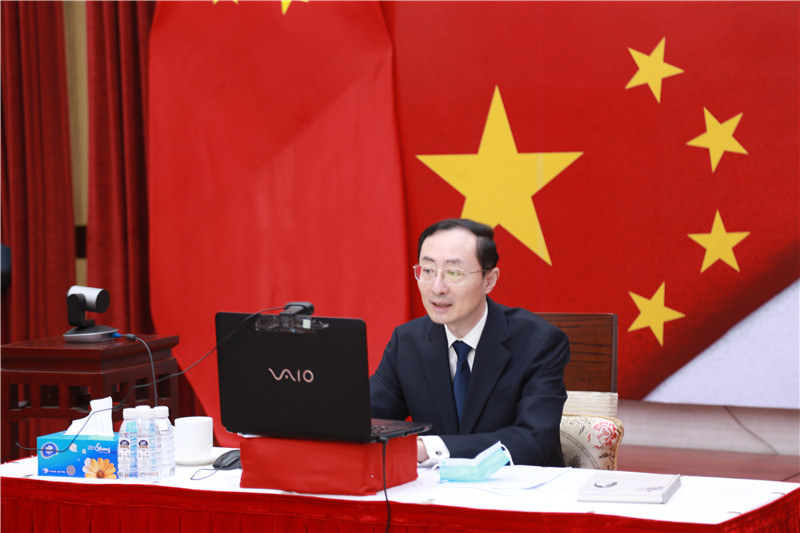|
(10:00AM, Oct 26, 2020 )

Shri V. Narayanasamy, Hon'ble Chief Minister of Pondicherry
Shri K. Lakshminarayanan, Parliamentary Secretary to Chief Minister of Pondicherry
Ms. Radha Srinivasagopalan, Director of Xu Fancheng Culture Study Center
Dr. Das Bikash Kali, Deputy Director of Xu Fancheng Culture Study Center
Mr.Peng Shaoyun, Deputy Secretary General, Yunnan Provincial People's Association for Friendship with Foreign Countries
Mr.Yang Xibin, Director, Foreign Affairs Office of Dali Bai Autonomous Prefecture
Ladies and Gentlemen,
Dear friends,
Good morning!
It's a great pleasure to attend today's event and unveil the Essays in memory of Xu Fancheng together with Chief Minister of Pondicherry. On this special occasion, I would like to convey my warm congratulations to the inauguration of Xu Fancheng Culture Study Center. I would also like to express my sincere thanks to Hon'ble Chief Minister Shri V. Narayanasamy, Shri K. Lakshminarayanan, Ms. Radha, Mr. Das and friends who have long been committed to promoting friendly exchanges between China and India.
President Xi Jinping pointed out that diversity leads to exchanges among civilizations, which in turn promote mutual learning and further development. As two ancient civilizations, China and India have a long history of cultural exchanges. More than 1,000 years ago, Chinese monk Xuanzang traveled to India and brought Buddhist scriptures back to China. Over 1,000 years later, with a yearning for Indian culture, Prof. Xu Fancheng came to this magical land. He had worked and lived in India for 33 years. During this period, Prof. Xu systematically translated classic Indian philosophical works such as "Bhagavad Gita" and "Fifty Upanishads". He also introduced the great Indian thinker Aurobindo to China. He taught Chinese culture in India for a long time, and translated a large number of Chinese classics into English, which opened an important window for people in India and around the world to understand China. We may say that Prof. Xu Fancheng is a well-deserved "Xuanzang" of our times.
The establishment of Xu Fancheng Culture Study Center will be helpful for a comprehensive and systematic study of the academic achievements of Prof. Xu Fancheng and a deep excavation of its connotation. I hope that the center can inherit and carry forward the spirit of Prof. Xu Fancheng's rigorous scholarship, introduce his life and research results to the two peoples, enhance the cultural and academic exchanges between China and India, and let the seeds sown by Prof. Xu Fancheng blossom and bear fruits in the new century.
Ladies and Gentlemen, dear friends,
Cultural and people-to-people exchanges are a major pillar of China-India relations. Since modern times, China and India have supported and helped each other in pursuit of national independence and liberation. In the 1920s, Rabindranath Tagore visited China twice. He highly praised China-India friendship, condemned colonial aggression, and called on China and India to join hands to make up for the defects of Western civilization with wisdom of the East. At the invitation of Tagore, Mr. Tan Yunshan went to the International University of India to establish the Cheena Bhawan, and actively spread Chinese culture. Mr. Xu Beihong, a famous Chinese artist travelled to India to hold a painting exhibition and raise funds for the Chinese People's War of Resistance against Aggression. He completed his masterpiece painting "The Foolish Old Man Who Removed the Mountains" in India. Together with these sages, Prof. Xu drew a splendid chapter of China-India cultural and people-to-people exchanges.
Friendship between the peoples is the solid foundation of bilateral relations. No matter how the external situation changes, the friendly exchanges between our two peoples have never been stopped. I'm happy to see representatives from the educational and cultural circles of the two countries get together today to discuss the culture of China and India. In the future, we should hold more such events to set up platforms for exchanges between our two peoples and enhance mutual respect, understanding and trust. I'm also very pleased to see many young faces in today's event. Young people represent the future of the world. We should encourage the young people of our two countries to carry on the fine traditions of the older generation, and contribute more wisdom and vitality to enhancing the friendship between our two peoples and promoting exchanges and cooperation in various fields.
Local exchanges are an important driving force for the bilateral relations. Pondicherry is an example of Indian multiculturalism where East meets West. People of different nationalities and faiths live in harmony. Prof. Xu Fancheng had been living here for 27 years, where he completed most of his works in his life, leaving behind a large number of paintings and calligraphy works. In recent years, Pondicherry is attracting more and more tourists from all over the world. We are also joined today by representatives from the Chinese city, Dali in Yunnan Province. Dali is also a beautiful and livable tourist city with rich cultural resources. Among Dali and Pondicherry, there can be more exchanges and cooperation in fields such as tourism, education, culture and urban governance to promote common development.
Ladies and Gentlemen, dear friends,
For more than 2,000 years, China and India as two major civilizations have been promoting exchanges and mutual learning with an open and inclusive attitude. It not only benefits the two peoples, but also makes the garden of world civilizations more colorful and vibrant. We should take the establishment of Xu Fancheng Culture Study Center as a new start to follow the footsteps of our predecessors and make greater contribution to China-India cultural and people-to-people exchanges.
I sincerely wish Xu Fancheng Culture Study Center continued success in the future!
Thank you!
|